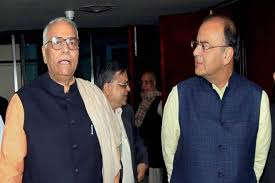The political slugfest over the economic slowdown escalated on Thursday, with finance minister Arun Jaitley hitting back at BJP dissident Yashwant Sinha as a “job applicant at 80”.
A day after Sinha accused him of making a mess of the economy, Jaitley defended his track record and repeatedly suggested that NDA was taking decisive steps, in contrast to UPA’s “policy paralysis”.
He also pointed out Sinha was the FM when India was staring at default in loan repayment with foreign exchange reserves of less than $4 billion in 1991. Similarly, Sinha was finance minister in the Vajpayee government when non-performing assets of banks were at 14-15% of their loans.
The finance minister did not spare either of his critics and predecessors Yashwant Sinha and P Chidambaram. He took a dig at Chidambaram, pointing to the Congress functionary’s long history of bitter rivalry with Sinha.
In recent days, the two have made common cause of attacking the government record. Jaitley dug out a series of statements made by the two former FMs, including one in which Sinha had accused Chidambaram of getting his phone bugged when he had raked up the Aircel-Maxis controversy. Going hard at Sinha, the finance minister referred to the book launch event he was speaking at and said, “Probably a more appropriate title for the book would have been ‘India @70, Modi @3.5 and a job applicant @80’.”
The book edited by Bibek Debroy and Ashok Malik is titled ‘India @70 Modi @3.5’. “I must confess that I do not have the luxury as yet of being a former finance minister. Nor, do I have the luxury of being a former finance minister who’s turned a columnist,” Jaitley said.
Being a former finance minister “I can conveniently forget a policy paralysis (during UPA-2). I can conveniently forget the 15% NPAs of 1998 to 2002 (when Sinha was FM). I can conveniently forget the $4 billion reserve left in 1991 and I can switch over and change the narrative … Acting in tandem itself won’t change the facts”, the minister said and recalled an early lesson in politics.
He said that BJP veteran L KAdvani had advised him to attack issues and not people, a principle he had followed over the years. “Because speaking on persons and then bypassing the issues is something which is very easily done,” he said.
Jaitley pointed to the 9-10% inflation during UPA regime, when Chidambaram was FM and repeatedly pointed to decisiveness in policymaking by the Modi government. This stood in contrast with UPA’s “policy paralysis” between 2012 and 2014. Besides, he said that a key decision of the Modi administration was to do away with discretion in the allocation of resources, something that had been abused during UPA regime.
The minister said that after coming to power, the Modi government had sought to clean up political funding and the administration was in final stages of reworking the rules. The minister also countered Sinha and Chidambaram’s criticism of economic growth moderating to 5.7% during the June quarter, arguing that the boom during 2003 to 2008 was driven by global factors.
“Growth rates are related to several factors, one of the factors is how you fit into the world. Is the world supportive or is the global economy stopping you from growing? There was a period from 2003 to 2008, when we grew with the global trend, and then the world slowed down. We became the fastest growing major economy for the first three years (of Modi government),” Jaitley said.
On the issue of investment, he said the Centre had stepped up spending along with public sector companies and said FDI inflows remained strong. He also said the government was in the process of cleaning up bank NPAs, a contrast to UPA when those in government, banking and RBI “looked the other way”.
He also pointed to a series of decisions to clean up the parallel economy and said demonetisation was also a step in the same direction and the move had its advantages, such as a 15.7% jump in direct tax collections led by a rise in personal income tax. He went on to say the move may have had an impact in the short-term but will be positive in the long-term and medium term.
He also took on critics of GST saying after being criticised for undertaking “incremental reforms”, which were not “big bang”, he was now being accused of rushing in with the shift to the new tax regime.
The lawyer-turned-politician said that unlike Congress leaders, finance ministers of states ruled by the party were fully backing the Centre on GST. In fact, two FMs of Congress-ruled states advised him against “blinking” on the launch date as it will result in being “derailed indefinitely”.
‘Job applicant at 80’ – Arun Jaitley’s response to Yashwant Sinha’s attack




